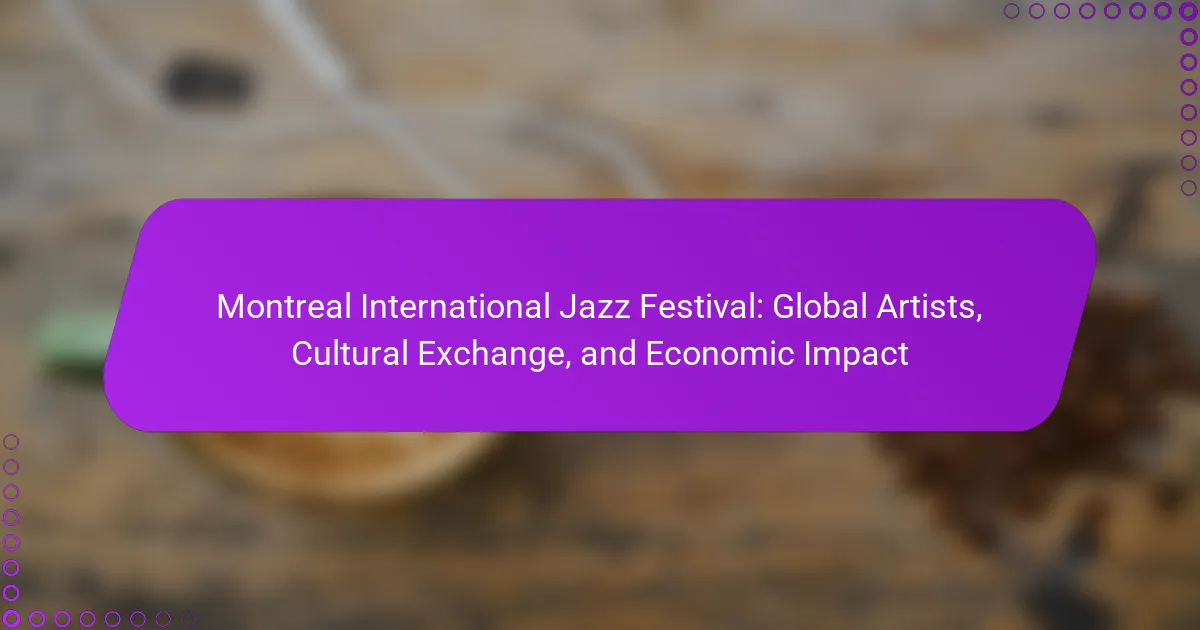The Montreal International Jazz Festival serves as a vital platform for global artists, fostering cultural exchange and generating significant economic impact. With over 2 million visitors annually, it showcases diverse performances while supporting emerging talent. The festival’s contributions to the local economy include millions in tourism revenue and job creation. Additionally, it faces challenges in adapting to post-pandemic realities and evolving audience preferences.
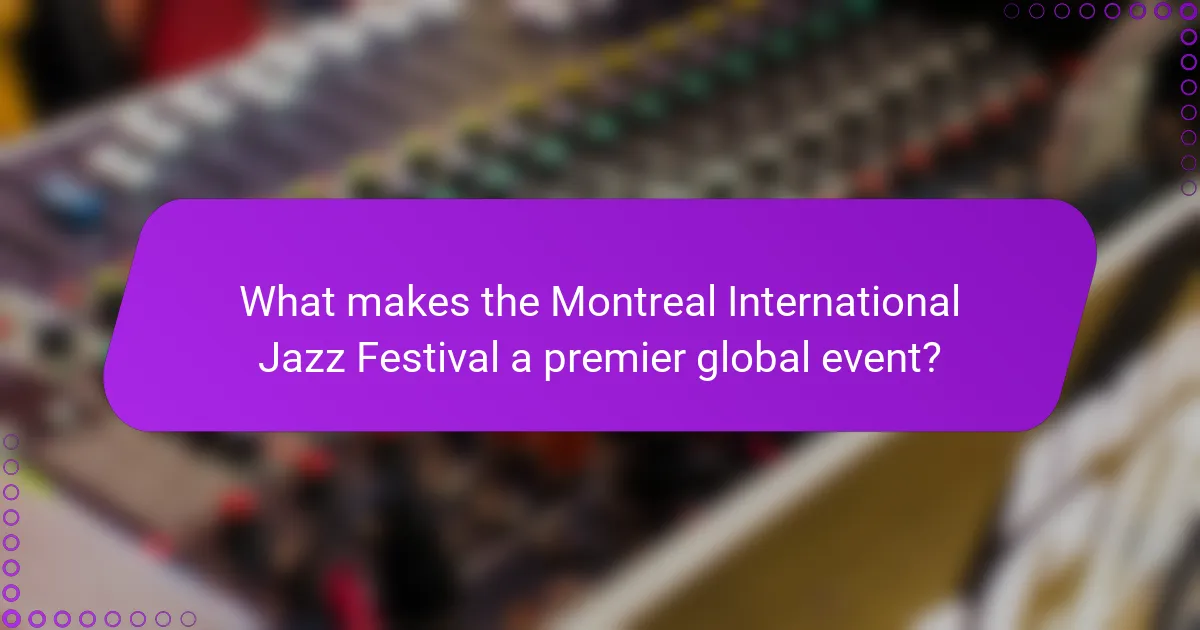
What makes the Montreal International Jazz Festival a premier global event?
The Montreal International Jazz Festival is a premier global event due to its diverse lineup of international artists, fostering cultural exchange and generating significant economic impact. The festival attracts over 2 million visitors annually, showcasing thousands of performances across various venues. It serves as a platform for emerging talent and established musicians alike, enhancing Montreal’s reputation as a cultural hub. The economic benefits include millions in tourism revenue, supporting local businesses and creating jobs. This unique combination of artistry, community engagement, and economic vitality solidifies the festival’s status on the world stage.
How does the festival showcase diverse musical genres and styles?
The Montreal International Jazz Festival showcases diverse musical genres through a wide array of performances. Artists from various cultural backgrounds present jazz, blues, world music, and fusion styles. This festival features over 3,000 artists from more than 30 countries, promoting cultural exchange. Unique collaborations often emerge, highlighting the festival’s role in blending traditional and contemporary music forms. As a result, attendees experience a rich tapestry of global sounds and artistic expression.
Which renowned artists have performed at the festival over the years?
The Montreal International Jazz Festival has hosted numerous renowned artists, including Miles Davis, Diana Krall, and Herbie Hancock. Over the years, these performances have enriched the festival’s cultural exchange and showcased global talent. Other notable artists include Wynton Marsalis, Norah Jones, and Stevie Wonder, all contributing to the festival’s reputation as a premier jazz event. The diverse lineup reflects the festival’s commitment to celebrating jazz in its many forms.
What role does the festival play in promoting cultural exchange?
The Montreal International Jazz Festival fosters cultural exchange by showcasing global artists and diverse musical traditions. This festival attracts talent from various countries, promoting artistic collaboration and cultural dialogue. As a result, attendees experience a rich tapestry of sounds, enhancing mutual understanding and appreciation. The economic impact further supports local communities, creating opportunities for cultural enrichment.
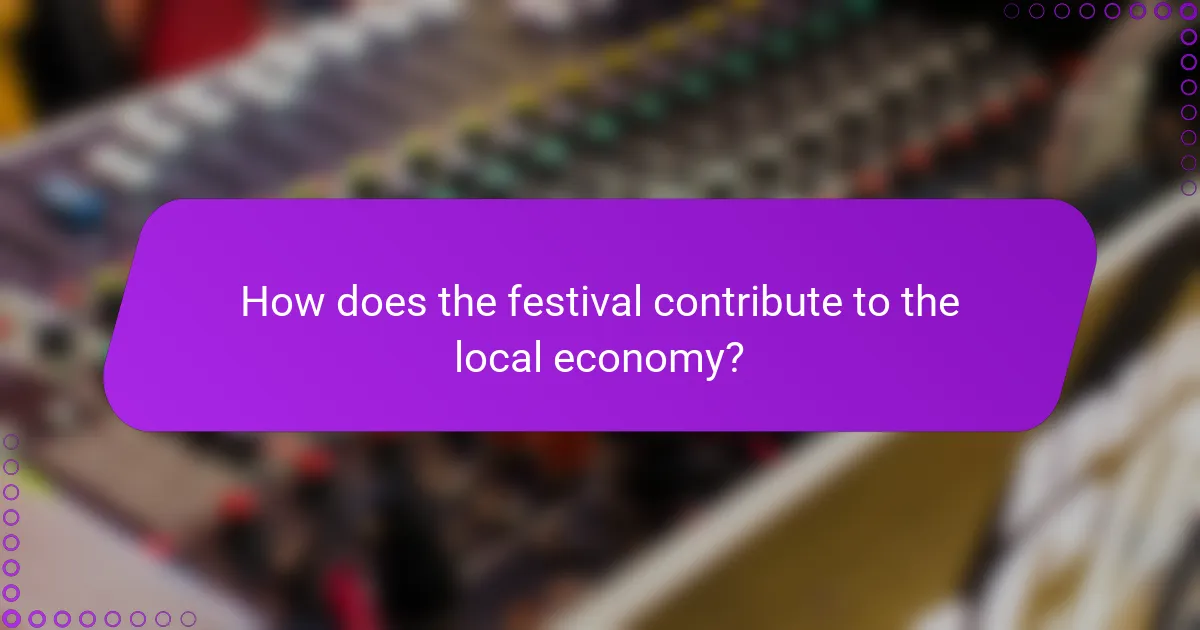
How does the festival contribute to the local economy?
The Montreal International Jazz Festival significantly boosts the local economy. It generates millions in revenue through tourism, hospitality, and related sectors.
The festival attracts over 2 million visitors annually, contributing approximately $40 million to the local economy. Local businesses, including restaurants and hotels, see increased sales during the event.
Moreover, the festival creates temporary jobs for artists, vendors, and staff, enhancing employment opportunities in the region. Cultural exchange fosters long-term economic benefits by promoting Montreal as a vibrant cultural destination.
What are the economic benefits for local businesses during the festival?
The Montreal International Jazz Festival significantly boosts local businesses through increased foot traffic and sales. During the festival, restaurants, hotels, and shops experience heightened customer engagement, leading to a surge in revenue. For instance, local eateries report a 30% increase in patrons, showcasing the festival’s role in stimulating the economy. Additionally, the event fosters cultural exchange, attracting both local and international visitors, which enhances community visibility and supports long-term economic growth.
How does tourism increase during the festival period?
Tourism significantly increases during the Montreal International Jazz Festival due to its global appeal and diverse programming. The festival attracts over two million visitors annually, generating substantial economic impact through spending on accommodation, dining, and entertainment. This influx enhances cultural exchange as international artists perform alongside local talents, fostering a vibrant atmosphere. Additionally, the festival’s extensive marketing and community involvement create a unique experience that draws tourists from around the world.
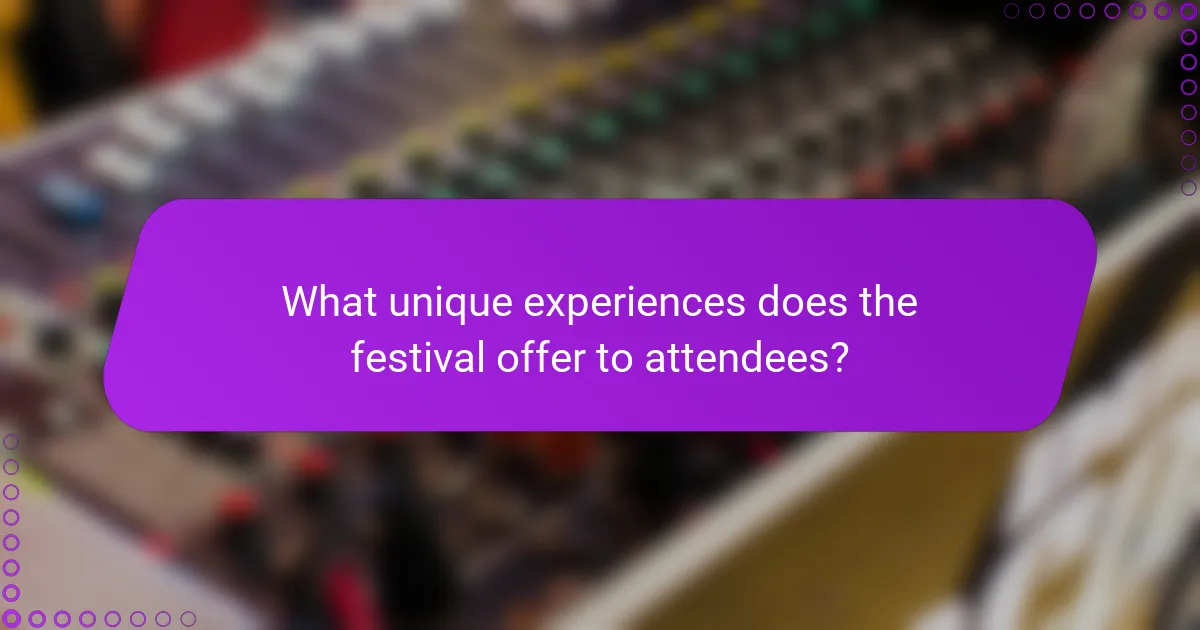
What unique experiences does the festival offer to attendees?
The Montreal International Jazz Festival offers unique experiences through diverse performances, cultural exchanges, and interactive workshops. Attendees enjoy live music from global artists, fostering a rich cultural tapestry. The festival also features jam sessions, allowing participants to collaborate with musicians. Economic impact includes local business boosts and tourism growth.
Which interactive events and workshops are available for participants?
The Montreal International Jazz Festival offers various interactive events and workshops for participants. These include masterclasses with renowned musicians, jam sessions for aspiring artists, and cultural exchange programs that foster collaboration among global artists. Additionally, workshops focus on music production, improvisation techniques, and the business of music, enriching the festival experience and promoting artistic growth.
How do VIP experiences enhance the festival atmosphere?
VIP experiences significantly enhance the festival atmosphere by providing exclusive access and personalized interactions. These experiences often include premium seating, private lounges, and meet-and-greet opportunities with artists, fostering a deeper connection between attendees and performers. As a result, VIP guests enjoy a heightened sense of luxury and engagement, which enriches the overall festival experience. Additionally, the presence of VIP areas creates a vibrant social environment, attracting diverse audiences and encouraging cultural exchange among festival-goers. This dynamic contributes to the festival’s economic impact by drawing more visitors and increasing spending on local businesses.
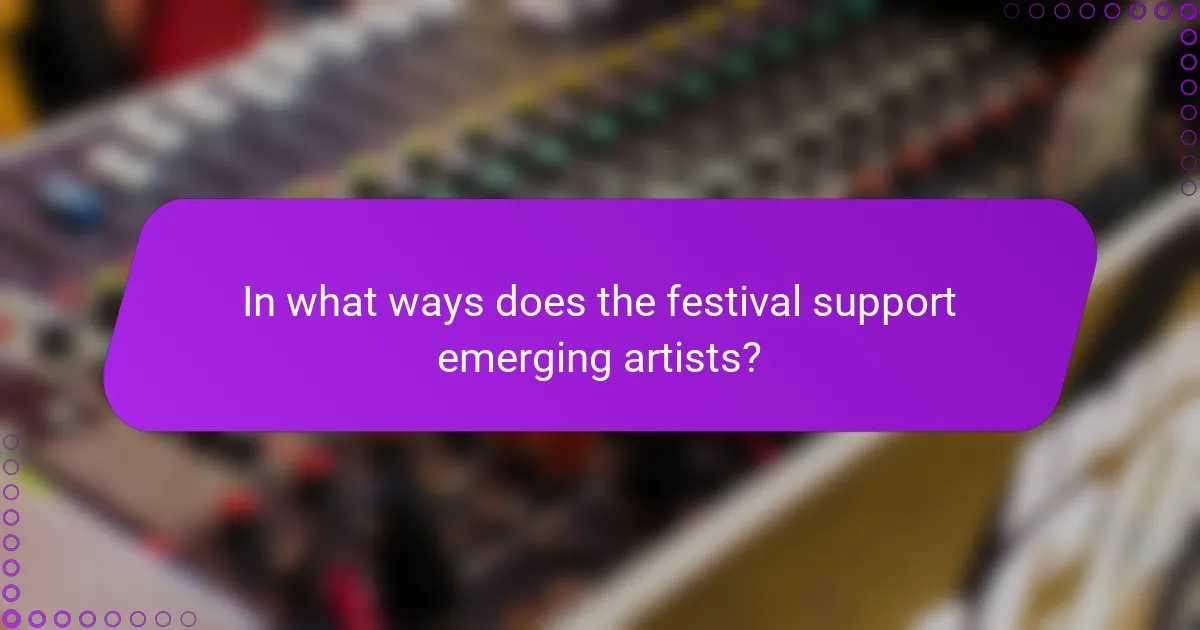
In what ways does the festival support emerging artists?
The Montreal International Jazz Festival supports emerging artists by providing a platform for exposure, networking opportunities, and financial support. The festival features a dedicated stage for new talent, showcasing diverse musical styles. Emerging artists gain visibility to industry professionals and potential fans, enhancing their career prospects. The festival also offers workshops and mentorship programs, fostering skill development and artistic growth. Additionally, collaborations with established artists create valuable learning experiences for newcomers.
What initiatives are in place for showcasing local talent?
The Montreal International Jazz Festival showcases local talent through various initiatives. These include dedicated stages for emerging artists, collaboration with local music schools, and community outreach programs. The festival provides a platform for local musicians to perform alongside global artists, fostering cultural exchange. Additionally, it drives economic impact by attracting visitors and promoting local businesses.
How does the festival facilitate networking opportunities for artists?
The Montreal International Jazz Festival facilitates networking opportunities for artists through diverse performances and collaborative events. Artists connect during jam sessions, workshops, and panel discussions, fostering relationships that enhance cultural exchange. The festival attracts global talent, creating a rich environment for collaboration. Additionally, industry professionals attend, offering valuable insights and potential partnerships.
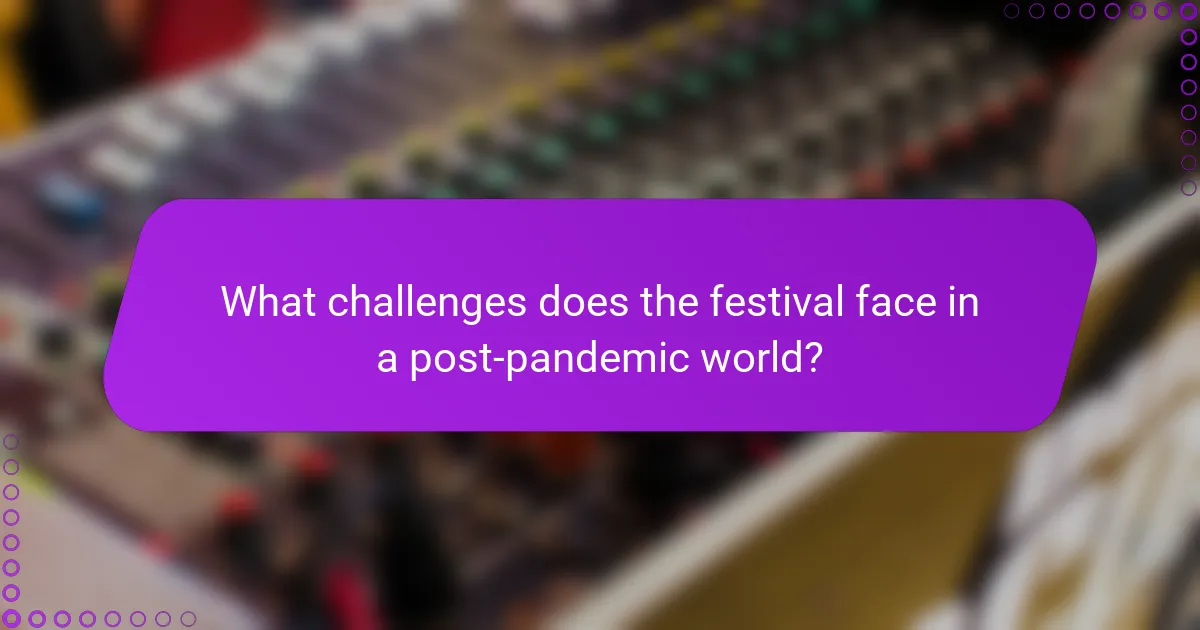
What challenges does the festival face in a post-pandemic world?
The Montreal International Jazz Festival faces several challenges in a post-pandemic world, including reduced attendance, logistical issues, and evolving audience preferences. Attendance has declined due to lingering health concerns and travel restrictions. Logistically, organizing large events remains complex with fluctuating regulations. Additionally, artists and audiences now prioritize digital experiences, necessitating a hybrid model for future festivals. These factors impact the festival’s economic viability and cultural exchange initiatives.
How has the festival adapted to changing audience expectations?
The Montreal International Jazz Festival has adapted to changing audience expectations by diversifying its programming and enhancing accessibility. It now features a broader range of genres, including world music and fusion, attracting a wider demographic.
Additionally, the festival has increased its digital presence, offering virtual performances and interactive experiences. This shift caters to global audiences and those unable to attend in person.
Moreover, the festival emphasizes sustainability, aligning with audience values on environmental responsibility. This commitment enhances its cultural relevance and community engagement.
Through these adaptations, the festival maintains its status as a premier cultural event while responding to evolving audience preferences.
What measures are being taken to ensure safety and accessibility?
The Montreal International Jazz Festival prioritizes safety and accessibility through various measures. Enhanced crowd management ensures a smooth flow of attendees. Accessibility features include designated viewing areas and services for individuals with disabilities. Safety protocols involve trained personnel, medical assistance stations, and emergency response plans. These initiatives foster an inclusive environment, promoting cultural exchange among global artists and audiences.
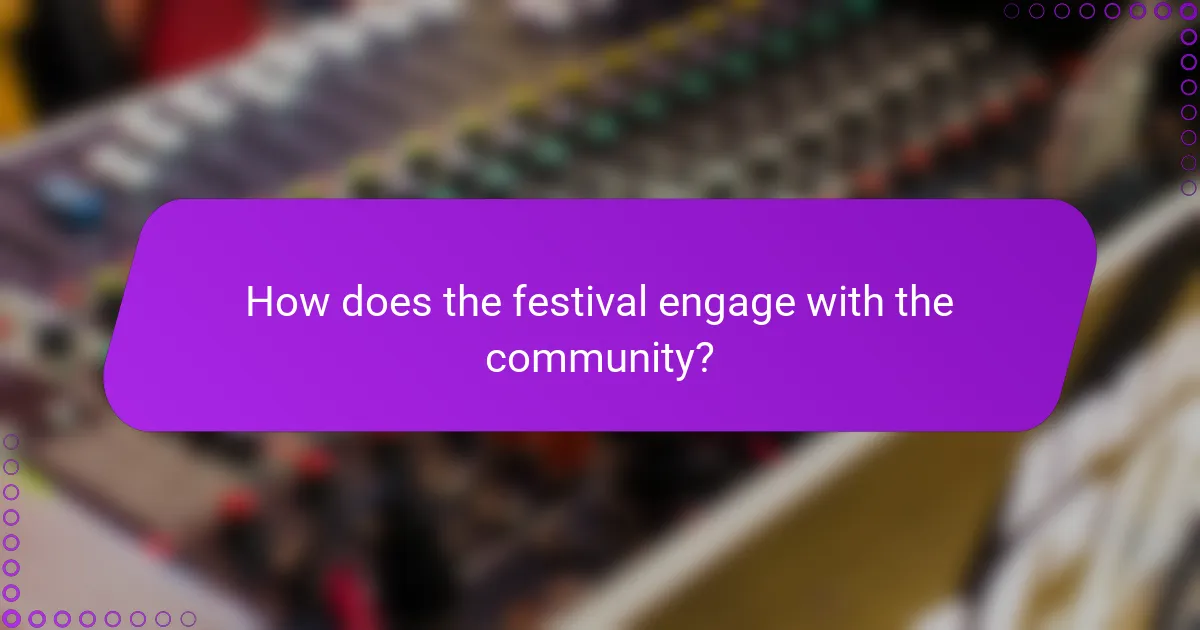
How does the festival engage with the community?
The Montreal International Jazz Festival engages with the community through various programs and initiatives that promote cultural exchange and economic growth. Local artists are featured alongside global talents, fostering collaboration and diversity. Educational workshops and outreach programs enhance community involvement, while the festival generates significant economic impact, attracting tourists and supporting local businesses. This blend of cultural celebration and community engagement underscores the festival’s commitment to enriching Montreal’s cultural landscape.
What outreach programs are implemented to involve local residents?
The Montreal International Jazz Festival engages local residents through various outreach programs. These include community workshops, free concerts, and educational initiatives that promote cultural exchange and participation. The festival collaborates with local schools and artists to enhance accessibility and foster a sense of community. Additionally, volunteer opportunities allow residents to be directly involved in the event’s operations, strengthening local ties and economic impact.
How does the festival promote music education among youth?
The Montreal International Jazz Festival promotes music education among youth through workshops, masterclasses, and interactive performances. These initiatives engage young participants with industry professionals, enhancing their skills and knowledge. The festival also collaborates with local schools, providing resources and opportunities for students to experience live music. As a result, it fosters a deeper appreciation for jazz and encourages future generations to pursue musical careers.
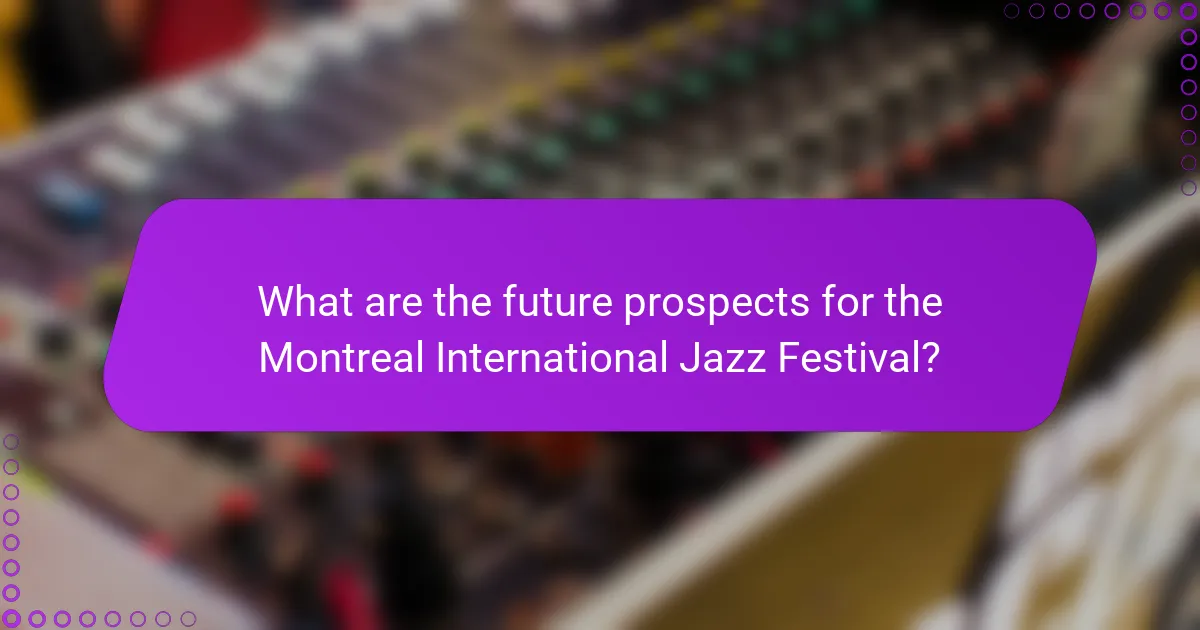
What are the future prospects for the Montreal International Jazz Festival?
The future prospects for the Montreal International Jazz Festival are promising, with continued growth in global artists, cultural exchange, and economic impact. The festival attracts over two million visitors annually, showcasing diverse musical talent. As a result, it fosters international collaboration and supports local economies. The integration of digital platforms may enhance audience engagement, reaching wider demographics. Additionally, sustainability initiatives could further strengthen its reputation as a leader in cultural events. The festival’s adaptability to trends will be crucial for its ongoing success.
How is technology shaping the festival experience in 2025?
Technology is enhancing the festival experience by integrating immersive digital platforms and real-time connectivity. In 2025, the Montreal International Jazz Festival will leverage augmented reality to create interactive performances, allowing global artists to engage audiences in novel ways. Mobile apps will provide personalized schedules, enabling attendees to discover cultural exchanges and economic opportunities efficiently. Additionally, data analytics will optimize crowd management, ensuring a seamless experience for festival-goers while boosting local businesses. These advancements will solidify the festival’s reputation as a hub for innovation and cultural celebration.
What trends are emerging in festival programming and audience engagement?
Emerging trends in festival programming focus on inclusivity, sustainability, and innovative audience engagement strategies. The Montreal International Jazz Festival exemplifies these trends by featuring diverse global artists and promoting cultural exchange.
The festival has adopted eco-friendly practices, such as reducing waste and utilizing renewable energy sources. This commitment enhances its appeal to environmentally conscious attendees. Additionally, interactive experiences, like workshops and Q&A sessions with artists, foster deeper connections between performers and audiences.
Digital engagement is also on the rise, with live streaming and virtual reality experiences allowing broader access to performances. This trend reflects a shift towards hybrid formats that cater to diverse audience preferences.
Overall, the Montreal International Jazz Festival’s approach to programming and audience engagement illustrates how festivals can adapt to contemporary cultural and environmental demands while maximizing their economic impact.
What best practices can enhance the festival’s impact and sustainability?
To enhance the Montreal International Jazz Festival’s impact and sustainability, focus on community engagement, eco-friendly practices, and diverse programming. Engaging local artists fosters cultural exchange and strengthens community ties. Implementing sustainable practices, such as waste reduction and renewable energy use, minimizes environmental impact. Offering diverse programming attracts broader audiences and promotes inclusivity, enhancing economic benefits.
